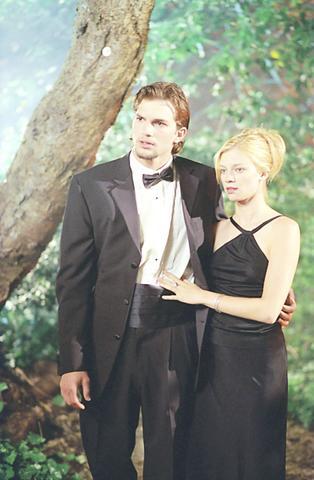Even by the lax standards of January film releases -- this month is the traditional dumping time for studio films that didn't quite work out -- The Butterfly Effect is staggeringly bad.
Starring Ashton Kutcher, the shaggy-haired young actor best known for Dude, Where's My Car? and for dating Demi Moore, Butterfly is a supposed thriller that mines the memory loss theme that has been turning up with striking regularity in American movies, from Memento to Paycheck. Kutcher's character, Evan Treborn, is an earnest college student whose life has been marked by a series of blackouts surrounding traumatic events. Majoring in psychology (he keeps a rat maze in his dorm room), he hopes to discover the reason behind the mysterious black holes in his mind.
Simple self-protection might be one possible explanation, given that his repressed memories include, as the film reveals in a spiraling series of flashbacks, being nearly strangled to death as an eight-year-old by his criminally insane father; being forced to participate in a child pornography video directed by the abusive father (Eric Stoltz) of the little girl, Kayleigh, he has a crush on; watching as a young woman and her baby are blown to bits in a practical joke gone wrong; and watching as the neighborhood bully, Tommy (who also happens to be Kayleigh's brother), ties Evan's beloved terrier up in a canvas bag and sets it on fire. That's a lot to handle right there, but the film's writing and directing team, Eric Bress and Mackye Gruber, have some even more appalling atrocities in store for Evan as a young adult.

PHOTO COURTESY OF FOX FILMS
For reasons the film does not trouble to explain, Evan discovers that, if he reads a few lines from his childhood journals, he will be projected back in time to his traumatic moments, where he can change his behavior in small ways that will make a big difference later on. (This is where the title comes in, with its reference to the old canard about a butterfly flapping its wings in China and producing a tidal wave in New York.)
Sometimes Evan's adjustments seem to work out, as when he awakes from a time-travel session to find himself sharing a sorority house bed with Kayleigh, now grown into a radiantly happy 18-year-old (played by Amy Smart). But mostly his changes just lead to greater disasters, including one alternate reality in which Kayleigh is a scarred, drug-addled prostitute, living in what looks like Jodi Foster's old digs in Taxi Driver, and another in which Evan loses his arms and the use of his legs.
The complicated plotting soon spins wildly out of the control of the filmmakers (their last credit: Final Destination 2) and begins producing unintentional laughs, as when Evan wakes up to find himself the newest and prettiest resident of a prison full of predatory neo-Nazi homosexuals.
But if the storytelling induces brain cramp, the imagery brings on a bad case of acid indigestion. The Butterfly Effect is inhabited by a genuine spirit of cruelty, both toward its characters and its audience.

June 9 to June 15 A photo of two men riding trendy high-wheel Penny-Farthing bicycles past a Qing Dynasty gate aptly captures the essence of Taipei in 1897 — a newly colonized city on the cusp of great change. The Japanese began making significant modifications to the cityscape in 1899, tearing down Qing-era structures, widening boulevards and installing Western-style infrastructure and buildings. The photographer, Minosuke Imamura, only spent a year in Taiwan as a cartographer for the governor-general’s office, but he left behind a treasure trove of 130 images showing life at the onset of Japanese rule, spanning July 1897 to

One of the most important gripes that Taiwanese have about the Democratic Progressive Party (DPP) is that it has failed to deliver concretely on higher wages, housing prices and other bread-and-butter issues. The parallel complaint is that the DPP cares only about glamor issues, such as removing markers of Chinese Nationalist Party (KMT) colonialism by renaming them, or what the KMT codes as “de-Sinification.” Once again, as a critical election looms, the DPP is presenting evidence for that charge. The KMT was quick to jump on the recent proposal of the Ministry of the Interior (MOI) to rename roads that symbolize

On the evening of June 1, Control Yuan Secretary-General Lee Chun-yi (李俊俋) apologized and resigned in disgrace. His crime was instructing his driver to use a Control Yuan vehicle to transport his dog to a pet grooming salon. The Control Yuan is the government branch that investigates, audits and impeaches government officials for, among other things, misuse of government funds, so his misuse of a government vehicle was highly inappropriate. If this story were told to anyone living in the golden era of swaggering gangsters, flashy nouveau riche businessmen, and corrupt “black gold” politics of the 1980s and 1990s, they would have laughed.

Imagine being able to visit a museum and examine up close thousand-year-old pottery, revel alone in jewelry from centuries past, or peer inside a Versace bag. Now London’s V&A has launched a revolutionary new exhibition space, where visitors can choose from some 250,000 objects, order something they want to spend time looking at and have it delivered to a room for a private viewing. Most museums have thousands of precious and historic items hidden away in their stores, which the public never gets to see or enjoy. But the V&A Storehouse, which opened on May 31 in a converted warehouse, has come up